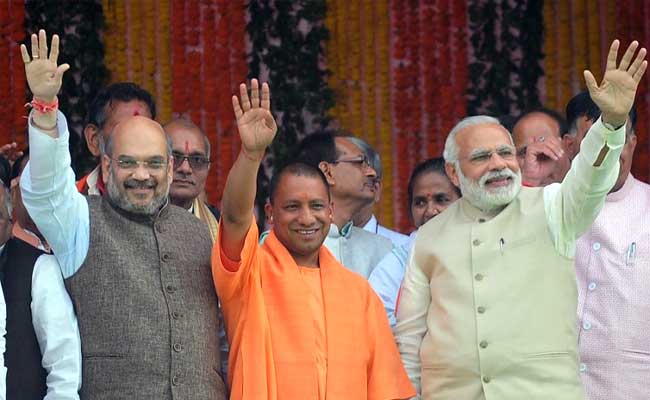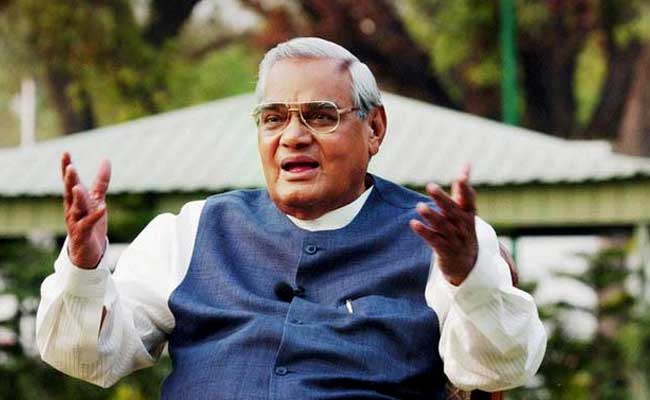Vajpayee was an out-and-out RSS product. His biographer, Ullekh NP, tells the amusing story of how young Atal's father was totally opposed to his son going to RSS shakhas. He reckoned without Atal's elder sister, who would throw his knickers over the wall after the young boy had slipped out of the house so that he could pull them on under his dhoti before he reached the RSS grounds.
But something seems to have profoundly changed when he moved out of the provincial setting of his Gwalior home and arrived in the cosmopolitan capital of the modern, independent, democratic, secular and socialist nation being fashioned by Jawaharlal Nehru. While his earliest association with national politics had been as private secretary to Syama Prasad Mookerjee, founder of the Bharatiya Jana Sangh, once Vajpayee was elected to the Lok Sabha in 1957 at the very young age of 31-going-on-32, he came, as many of that generation did, under the spell of the first Prime Minister of India. The fascination was reciprocated, for soon after encountering the young man in parliament, Nehru confided in his colleagues that he thought Atal Bihari would one day step into his shoes to lead the nation - an astonishingly prescient observation, especially with regard to not a follower, but a challenger to Nehru's vision of India.
Former Foreign Secretary Maharajakrishna Rasgotra recounts in his autobiography, A Life in Diplomacy, published last year, that when Vajpayee was included by Nehru in the Indian delegation to the UN, Nehru's secretariat sent Rasgotra, then a junior officer in our permanent mission to the UN in New York, a message conveying the Prime Minister's personal "desire" that Rasgotra must ensure that Vajpayee was introduced to as many world leaders as possible because Nehru thought the young MP had great potential. I cannot imagine Nehru reacting the same way to Modi!
Vajpayee was completely taken up with the marvels of parliamentary democracy. Not only was he quickly recognized as a quite exceptional speaker, he swarmed around Central Hall, making life-long friendships with life-long political opponents. He loved the cut-and-thrust of parliamentary debate and spent hours in the House both intervening but, more importantly, listening to others. He had none of that contempt for parliament, its procedures, its dilatory ways, that is so much in evidence in Modi's reluctance to even come to the House, let alone spend hours, as Nehru did, listening to criticism and responding to it. For Nehru, the House was where the nation's crises must be exposed and pondered over, even at the worst of times, possibly most importantly, precisely at times of national crisis. In these columns, I have told in detail of Nehru summoning both Houses bang in the middle of the Chinese invasion in 1962 because 36-year old Vajpayee, exactly half Nehru's age at the time, asked him to do so, and then sitting patiently through Vajpayee's searing attack on him and his policies.
Through his interaction with parliament and the mentorship of Jawaharlal Nehru, Vajpayee became a firm believer in democracy and the spirit of accommodation that democracy requires. He learned to respect opinions he did not share. From there, he moved seamlessly towards collective responsibility in government, in stark contrast to Modi's domineering, centralizing, authoritarian ways. This frequently got Vajpayee in trouble with die-hards in his party (think Balraj Madhok) and the RSS/Vishwa Hindu Parishad. The RSS mole in the BJP, Govindacharya, infamously (if accurately) described Vajpayee as a "mukhauta" (a mask) - for Vajpayee always resisted the extremism in thought, word and deed that today's BJP stalwarts (Modi-Shah-Yogi) exemplify.

BJP chief Amit Shah, UP Chief Minister Yogi Adityanath and Prime Minister Narendra Modi (File photo)
Vajpayee's weapon was the disarming smile, the quote that raised a laugh. Ullekh recalls Vajpayee quoting Mirza Ghalib at Finance Minister Manmohan Singh during the 1992 debate that followed his game-changing budget. Looking at the Sikh FM, eyes twinkling, Vajpayee recited:
Aah ko chahiye, ek umr asar hone tak
Kaun jeeta hai, teri zulf ke sar hone tak?
Ullekh translates this as:
A sigh needs a life-time to show its effects,
I suffer while you nonchalantly fix the tangles in your hair
Manmohan Singh, whose entire primary education was in Urdu, instantly understood the verse, and was infuriated at what he took to be an offensive reference to his own long hair. On learning this, "Vajpayee immediately called Singh and told him not to be offended by his comments as they were meant to score political points. Singh was mollified, and Vajpayee won himself a new friend". (Ullkeh, The Untold Vajpayee, Penguin/Viking, 2016, pp.150-151)
Modi is no laggard at jibes. But there is not an iota of graciousness towards his verbal victims. He leaves a trail of bitterness in his wake. Hence, where Vajpayee thoroughly disapproved of hate-mongering and stoking street violence, and kept away from those doing so, Modi surrounds himself with party leaders, MLAs and MPs who have contempt for democratic institutions, humanitarian principles, human rights, minority rights - and has now had the temerity appoint as Chief Minister of UP the founder of the Hindu Yuva Vahini with its history of violence in politics and inter-community relations (as related in my rebuttal of Chandan Mitra's paean of praise to him). In quite a different context, Vajpayee once said in parliament: "If Dhritarashtra is surrounded by Duryodhana and Dushasan, he cannot move on the path of justice even if he wants to." How true! What would Vajpayee have made of the Duryodhanas and Dushasans that surround the Yogi and provide the fodder from parliament that today's PM is feeding to state governments secured by him?

Atal Bihari Vajpayee always resisted the extremism in thought, word and deed
(By way of a perhaps not altogether irrelevant aside, might I recall that at the time of Murli Manohar Joshi's Ekta Yatra, I had written an article labelling Joshi, the serving President at the time of the BJP, as a "Hindu Jinnah"? It so happened that the same week, I was standing to the right of Vajpayee at a Rashtrapati Bhavan banquet for Yasser Arafat. Instead of slowly walking past the guests shaking hands with them, as is the usual protocol, Arafat marched straight to the opposite end of the Hall, obliging us to form a queue to go past him. This meant Vajpayee would be behind me. So, I politely asked him to change places with me so that he might be ahead of me. He demurred, murmuring, "Akhir mein hoon kaun? Mein toh bas ek Hindu Jinnah ka follower hoon!" - "After all, who am I? I am but a follower of a Hindu Jinnah!")
The point is that Vajpayee never limited his political interventions to his vote-bank. He extended himself comprehensively. Modi and his cohort are focused on their followers to the exclusion of those who do not vote en masse for them. Vajpayee was always too much of a democratic nationalist to not understand the imperative of inclusion in a nation and society founded on the principle of unity in diversity - diversity even in political opinion and ideology. So, when he founded the Bharatiya Janata Party (BJP) after the collapse of the Janata Party experiment, Vajpayee dedicated his new party to "Gandhian socialism". Were he to be similarly situated, I doubt that a non-Hindutva icon would fire Modi's imagination. He would be more likely to turn to someone like Savarkar for inspiration. Certainly, Yogi Adityanath, more VHP than RSS, would do so.
Last week, I attended a lecture at the Centre for the Study of Developing Societies where a Savarkar scholar, Vinayak Chaturvedi (named after Vinayak Damodar Savarkar), spoke on a subject that said it all in the very title of the lecture: "Hindutva and the Need for Cruelty". The Savarkar creed abhors non-violence. Hence, their intense dislike of Mahatma Gandhi, often disguised, as in Savarkar's post-assassination writings, as a critique of Buddhism. Savarkar believed, said Chaturvedi, that the opponent is always cruel and, therefore, there is need to be even more cruel, even more violent, even more brutal than him. Bloodshed, therefore, is the answer, for to resile from shedding blood is to leave one at the mercy of the oppressor. I shall restrain myself from saying more because Chaturvedi's deep study of Savarkar's thoughts and philosophy, based on his thorough reading and annotation of some 40,000 pages of unpublished writings of Savarkar lying in the archives of the Nehru Memorial Library, is due to be published next year. The lecture, however, enlightened me on why the Yogi Adityanaths and Modis seem to feel under siege all the time, despite belonging to an 80-85% religious majority, and therefore unleashing vigilante mobs and violence in the streets to prove their manhood.
That is why it is possible to compare Nehru and Vajpayee, but impossible to compare Vajpayee and Modi. They can only be contrasted.
This article owes a great deal to a personal conversation between the author and Ullekh N.P. that the author would like to acknowledge with grateful thanks. However, the responsibility for the opinion expressed here rests entirely with the author.
(Mani Shankar Aiyar is former Congress MP, Lok Sabha and Rajya Sabha.)
Disclaimer: The opinions expressed within this article are the personal opinions of the author. The facts and opinions appearing in the article do not reflect the views of NDTV and NDTV does not assume any responsibility or liability for the same.


